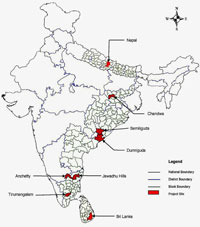project themes
Theme 2: Crop Production Enhancement
According to a recent report of the All India Coordinated Research Project (AICRP) on small millets, there is a wide gap in productivity between small millets on research stations and on farmers’ fields. This indicates that either currently available technologies are inappropriate for farmers’ fields or they are not disseminated through site specific action research. This project seeks to revive the culture of farmers’ experimentation by engaging them in diverse research activities to adapt and improve available scientific technologies.
Preparing sustainable agriculture kits
A systematic survey will be carried out on soil fertility, crop nutritional deficiency symptoms, farmers’ cultivation practices, water management, disease and pest issues, abiotic stresses, post-harvest storage and other constraints. Based on the study outcome, an inventory of best scientific practices and available technologies to match these challenges will be compiled from national, regional, and international research centers (e.g. ICRISAT) as well as from indigenous knowledge systems (elsewhere in India and Africa). A number of low-cost approaches already exist to address the problems of soil fertility, water management, and plant protection in a sustainable manner but have yet to be exploited for conditions experienced by small farmers.
One of the most promising of these innovations is the idea of low-cost agricultural kits. A team of innovative farmers, scientists, and village level development workers will adapt these locally through inclusion of seeds (improved millet seeds, improved seeds that can be intercropped with millets to promote nitrogen fixation, phosphate solubilization, and “push-pull”-type organic pest management), low cost technologies (to help farmers with on-farm diagnostics of soil nutrition; low cost grain storage bags; microbial bio-fertilizers, etc.) and a picture book of best practices for illiterate women farmers (e.g. how to make own quality seeds; cleaning seed of fungal pathogens; water harvesting).
The goal is to rapidly disseminate global knowledge and already-available low cost technologies to local women farmers based on local needs. The kits will be distributed first to the most innovative farmers who have the highest probability of using the seeds, technologies and information to start local grassroots agri-businesses.
On farm research on agronomic practices
Site specific on farm research trials will be conducted on farming and cropping systems. The on-farm experiments in this project will be conducted on fields of small and resource poor farmers. The project will also ensure participation of women managed farms resulting from male outmigration.
Promoting soil and water conservation
The project will explore opportunities to promote long term soil and water conservation measures at individual farm and collective levels as they complement the project’s focus on small millet production. Based on DHAN’s experience, the project will develop a location specific package of livelihood focused natural resource management measures on a pilot scale.
updates

